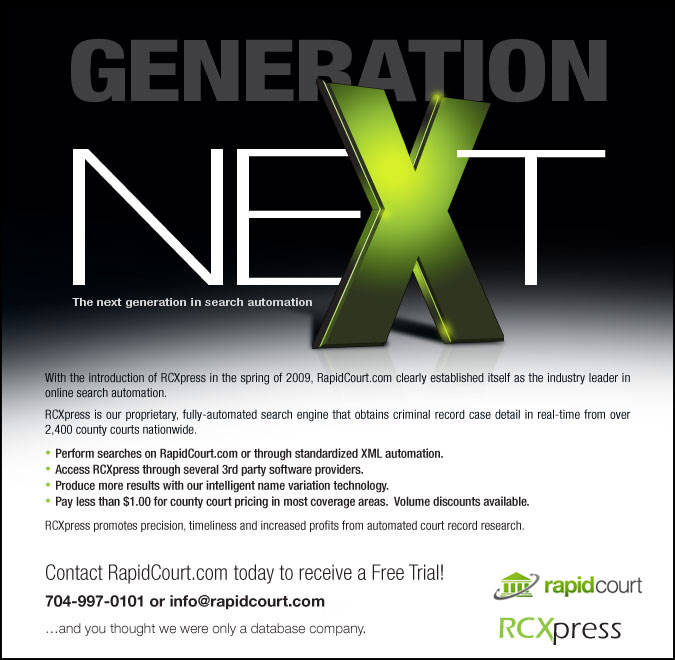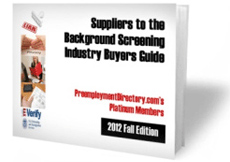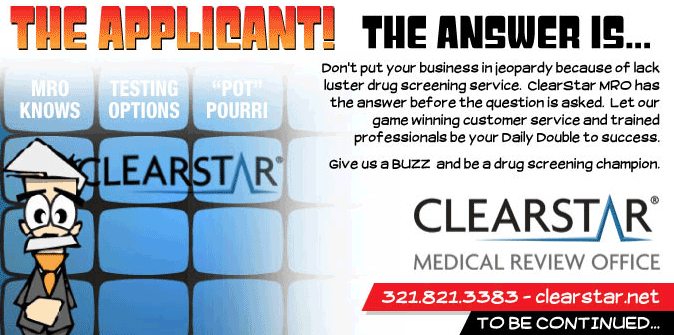| BACKGROUND
SCREENING NEWS |
2013
Employers Background Screening Survey Results
This years survey was conducted at the 2013 SHRM Annual Conference
held in Chicago in June. We received a total of 376 completed
surveys up from 325 last year.
The
key findings included:
-
Once
again, 'timeliness, cost and accuracy' were rated as the top
three challenges that end users face with background screening
in that order.
-
The
top innovations sought by end users that responded to the
survey remained identical to the top ranked responses in 2012:
Quick Turnaround, Online Web Based Capability and Better Integration
with HRIS and 'Ease of Use' pulled into a tie for the third
spot with 'Better Integration with HRIS.'
-
In response
to the new EEOC Guidance we added a new question regarding
the 'Use of arrest and criminal record.' Unsurprisingly the
leading answer was 'Decreased Use' at 56% and interestingly
6% actually indicated they 'Increased Use.'
-
Overall,
the satisfaction level (Extremely Satisfied and Very Satisfied)
remain exactly the same as last year at 62%. Barely Satisfied
also remained the same at 26%.
- The number of firms indicating they definitely
will seek a new provider rose 6 percentage points and the
number of firms that were 'Undecided' remained virtually the
same as last year.
Read
the full report

EEOC
Lawyers Discuss Misconceptions, Guidance About Criminal History
Checks
Tanisha
Wilburn, senior attorney adviser at the commission's Office
of Legal Counsel, addressed three misconceptions that have emerged
in the media at an event offered by the EEOC Training Institute.
She stated that especially in editorials, about the guidance
these misconceptions have been promulgated. For example, she
challenged the notion that the agency is restricting employers
from obtaining or using criminal records to screen its applicants
and employees. She stressed that the guidance does not prohibit
employers from using criminal history when making employment
decisions. Another inaccurate interpretation about the guidance
Wilburn said she has heard is that employers are required to
hire job applicants with criminal records who are unsuitable
for certain jobs. She said the guidance "does not require companies
to hire anyone," but simply "advises employers how they can
avoid Title VII liability if they use applicants' or employees'
criminal records to make employment decisions." The third misconception
she cited is that the policy imposes new Title VII requirements
on employers. Applying Title VII analysis to the use of criminal
records in employment decisions is well-established at the commission,
according to Wilburn.
In 1987
and 1990, the commission released three policy statements on
this issue explaining the Title VII analysis, Wilburn said.
"The truth of the matter is that the EEOC has been applying
Title VII analysis to the use of criminal records for a long
time."
Read more

Employment
Discrimination Pushes Felons Onto Food Stamp Rolls, Increasing
Program's Costs
By refusing to hire people who have been convicted of crimes,
employers may be adding billions of dollars to the total cost
of the country's ballooning food assistance program. Citing
data from the federal Bureau of Justice Statistics, Dean Baker,
co-director of the liberal Center for Economic and Policy Research,
estimated that about 2 million workers are shut out of the economy
each year as a result of a felony conviction or a prison record.
Assuming these ex-offenders then rely on food assistance, and
that half of them have an average of two kids, their economic
struggles cost taxpayers about $4 billion a year in food stamps
alone. Baker acknowledged that this estimate is crude, and said
the weak job market overall is what's largely responsible for
a recent jump in federal food stamp spending. But the true number
of ex-offenders receiving food stamps might be even higher;
Baker's calculations don't account for the many ex-offenders
who do find jobs but earn such low wages that they rely on food
stamps anyway. Republicans in the House of Representatives are
trying to reduce spending on the program, but they haven't yet
succeeded in passing legislation. Meanwhile, the Senate has
passed a bill that would deny food stamps to people convicted
of certain sexual and violent crimes.
Read
more

The Truth Behind "Ban the Box"!
At its most basic, "Ban the Box" means removing the "box" on
any application that asks whether the person has a prior criminal
history. In removing this box, it is believed that the possibility
of immediate discrimination towards those with a past criminal
record would be eliminated. It is also thought that by banning
this box that the "disparate discrimination" against minorities
will be lessened. "Ban the Box" legislation restricts an employer
from asking about a candidate's criminal history prior to or
during the application process. It is only after making a conditional
offer of employment that an employer would be permitted to consider
the candidate's criminal history. It is still crucial for a
company to be aware of their obligations to their existing employees
and customers. Hiring a good background check company is a great
step in this direction. Qualified background check companies
help in this process by staying on top of all EEOC guidelines
and state and federal laws. A professional background check
company will also go to the source and check all criminal records
found during the background check process with the courts. "Ban
the Box" does not have to give an advantage solely to the applicant.
If done right, it also provides an employer with the ability
to protect themselves while still allowing the opportunity for
a "second chance".
Read
more



| BACKGROUND
SCREENING NEWS - continued |
Is
Your Background Screener Doing the Job? Here's How to Tell
Choosing
and monitoring your background screening vendor is as important
- and maybe more so even - than the interview you conduct with
candidates. "The worst thing you can do," says Fred Giles, chair
of the National Association of Professional Background Screeners,
"is to treat it (your background screening) like a commodity
and choose the lowest bidder." Once you have made a selection,
monitoring the performance and maintaining regular contact is
also a must. And, says Giles, "Most significant, most important,
is that employers make sure to review the process, their process
… Have a clearly defined process for evaluating the results
… and an opportunity for the candidate to explain (any
negatives)." In the wake of revelations that the nation's leading
security clearance background firm may have shortcut its procedures,
now is a good time for all employers using a background vendor
to review how the work is being done. Says Giles, "It is not
unreasonable to ask that the work being done be documented."
Especially for certain types of employment - education, for
instance - ask that the names of all contacts be included in
the report. It's also acceptable to have the vendor audit their
work." However, the best insurance, says Nick Fishman, an executive
with EmployeeScreenIQ, is to be diligent in the selection of
a background vendor.
Read
more
VerticalRent
Teams Up with Experian to Launch No Cost Tenant Screening Platform
Innovative
cloud-based solution hit the market in early July. Landlords
and Property Managers can screen UNLIMITED tenants with VerticalRent.
It's free to use with UNLIMITED units. No restrictions. Next
month we're releasing FREE online rent collection with our ProfitStars
partnership. Sign up today and help spread the word.
Read
more

Seattle
Latest City to "Ban the Box" for Private Employers
On June 20, 2013, the Mayor of Seattle signed an ordinance to
"ban the box" and otherwise restrict the use of arrest and conviction
records in the hiring and personnel decisions of most private
employers and of the City itself. Under the new Seattle ordinance,
employers may not advertise, publicize or implement any policy
or practice automatically or categorically excluding all individuals
with any arrest or conviction record from any employment position
to be performed in at least substantial part (at least 50% of
the time) within the City of Seattle. Notwithstanding this prohibition,
an employer may perform a criminal background check or require
a job applicant to provide criminal history information after
the employer has completed the initial screening of applications
or resumes to eliminate unqualified applicants, subject to limitations.
In addition, employers in Seattle and across the country should
take note of the Equal Employment Opportunity Commission's 2012
Enforcement Guidance on the Consideration of Arrest and Conviction
Records in Employment Decisions, to ensure that they are conducting
background checks in compliance with the Fair Credit Recording
Act (and its state equivalents) and any federal, state or local
laws limiting the use of criminal records in hiring and personnel
decisions.
Read more

Now,
More Than Ever: Make Sure Your Criminal Background Policy is
"Individualized" Enough
The recently
announced class action filed by the US Equal Employment Opportunity
Commission against Dollar General highlights the importance
for employers of making sure that they don't act too "automatically"
in rejecting applicants or terminating current employees based
on criminal convictions. In its June 11 press release announcing
the lawsuit, the EEOC alleged that the retail chain's policy
of conditioning job offers on criminal background checks had
a disparate impact on African-American applicants and employees.
An employer may be liable for violating Title VII even if its
policy requires criminal background checks of all applicants,
offerees, or employees, without regard to race or sex. If the
effect of such a neutral policy is to exclude members of certain
protected groups, and if the employer cannot make a showing
that the policy or practice is job-related and consistent with
business necessity, then the employer could be liable for discrimination.
There is no question that the EEOC is aggressively pursuing
disparate impact claims against employers who use criminal backgrounds
or credit histories as screening devices, so employers should
be cautious.
Read
more

International:
FATCA Compliance Pushed to 1 July 2014
The US
Department of the Treasury (Treasury) and the Internal Revenue
Service (IRS) have announced a six-month extension (to 1 July
2014) to the start of the Foreign Account Tax Compliance Act
(FATCA) withholding and due diligence requirements in order
to allow 'more time to complete agreements with foreign jurisdictions'.
The extension will also provide foreign financial institutions
(FFIs) with more time to comply with FATCA 'while helping to
ensure efficient implementation of the law'. Enacted by Congress
in 2010, FATCA introduced new customer identification, documentation,
reporting and withholding procedures with the objective of targeting
perceived tax abuse by US citizens through the use of offshore
bank accounts. FFIs will be required to provide information
on US accounts with a value exceeding $50,000, or be obliged
to either terminate their relationship with the account holder
or pay a 30% withholding tax applicable to the account holder's
income. The Treasury has collaborated with foreign governments
to develop two alternative model intergovernmental agreements
(IGAs) to help implement FATCA, particularly as regards compliance
with national data protection laws. To date, the Treasury has
signed nine IGAs, and 'is engaged in related conversations'
with more than 80 other jurisdictions.
Read
more

EEOC
and Blanket Prohibitions Against Hiring Individuals with Conviction
Records
On June
28th, the EEOC announced a settlement agreement with J.B. Hunt
Transport, Inc. - a transportation company - to resolve allegations
that the company discriminated against an African-American candidate
for a truck driver position, because J.B. Hunt's hiring policy
considers criminal convictions that are unrelated to the duties
of the job. The EEOC stated that blanket prohibitions against
hiring individuals with conviction records is not in accordance
with the EEOC's Enforcement Guidance on the Consideration of
Arrest and Conviction Records in Employment Decisions (April
2012). Under the terms of the agreement, J.B. Hunt will review
and/or revise its hiring policy as well as provide any additional
training to company employees about the hiring and selection
process. No civil penalties were announced as part of the agreement.
Employers with policies that categorically deny job applicants
from a position because of a criminal history - referred to
as a blanket prohibition - need to be aware that the EEOC is
charging such as a violation of Title VII of the Civil Rights
Act of 1964.
Read more

| Welcome
to the U.S. Legal Challenge Question! |
Sponsored By:


As the background
screening industry continues to get more competitive the firms
that will ultimately succeed will be those that create competitive
advantage through their people by offering continuous learning
opportunities to heightened their knowledge and capabilities.
We believe that having employees that are very knowledgeable about
the legal landscape of background screening is essential to continued
success.
We are grateful
to Larry D. Henry who began his law career with the Army JAGC
where he tried over 2,000 cases. After the Army he relocated to
Tulsa. In 1981, the founder of DAC Services contacted Mr. Henry's
firm for assistance in creating a background screening company.
Since Mr. Henry's practice was employment law, the firm believed
this fell within his area and as they say: "the rest is history".
His practice has kept him in continual contact with the background
screening industry, and he is a nationally recognized expert in
the area of background screening.
Mr. Henry's
practice is concentrated on employment law and in specific, background
screening of employees. He represents consumer reporting agencies
throughout the United States and two national trade associations.
He is the author of the Criminal Records Manual and the on line
reference site:CRAHelpDesk.com, and he is a frequent presenter
across the country on various topics dealing with background screening.
Please choose
your answer by clicking on it:

'Ban
the Box': a Major Milepost on a Long Road
On May 13
Gov. Mark Dayton signed "Ban the box" legislation, requiring private
employers in Minnesota to wait until someone is selected for an
interview before asking about criminal records; a major milepost
in the road to restoration: a road not only for people with criminal
records seeking employment, but for us as a society. Over the
last several decades, the number of Minnesotans throughout the
state with some type of a criminal record has increased to an
estimated 1 million, or one in five. Some estimates put it even
higher. Minnesota has the eighth highest percentage in the nation
of its citizens incarcerated or currently on some type of supervision
- in 1982 it was one in 98, today it is one in 26. With new and
easier access to these records through electronic databases, many
Minnesotans are turned away from employment for which they are
qualified even though their record may be unrelated to the job,
from long ago, or even inaccurate; oftentimes a job denial may
be simply based on an applicant's answer to a confusing question
about criminal records on the initial employment application.
"Ban the box" is just one policy solution to this problem, although
an important and game-changing one.
Read
more

Background
Checks Help Screen Workers But Could Also Expose Employer to Liability
The most
common rationale for conducting background checks is that employers
and staffing agencies face liability if they do not. If a business
engages someone who ends up harming someone else, the business
faces potential liability. Liability depends on whether the business
was negligent, and the elements of a claim of negligent hiring
or supervision vary from state to state. But not all screening
practices are equal. Along with ensuring job qualifications,
the use of background checks can help protect an employer against
liability for negligent hiring, supervision or retention. At the
same time, these policies may also expose an employer to liability
if they run afoul of the Equal Employment Opportunity Commission
(EEOC)'s guidelines. It is essential for staffing firms
and client companies to be aware of and remain in compliance with
any applicable state or federal law that may be implicated by
use of arrest or conviction information, or credit checks, in
making employment decisions.
Read more

Rhode Island Enacts "Ban the Box" Law Prohibiting Employment Application
Criminal History Inquiries Until the First Job Interview
Effective
January 1, 2014, a recent amendment to Rhode Island law will restrict
the timing of pre-employment
inquiries by Rhode Island employers about a job applicant's criminal
past. Employers who
are covered by the law may not inquire about an applicant's prior
criminal history until during or
after the first interview with the applicant. The amendment to
Rhode Island's Fair Employment Practices law reflects the trend
toward so-called "Ban the Box" laws that have been enacted in
other jurisdictions. Exempt from the prohibition are applications
for law enforcement agency positions or positions related to law
enforcement agencies. Aggrieved individuals may file an administrative
charge with the Rhode Island Commission for Human Rights (RICHR)
or a civil action alleging a violation of the Fair Employment
Practices law. The RICHR and Rhode Island courts have the authority
to award an aggrieved applicant with a range of remedies including
back pay, compensatory damages, punitive damages, and attorney's
fees and costs. Rhode Island and multi-state employers need to
make sure that their current job application complies with applicable
law, including this new law. Given the recent attention on background
checks by the EEOC, state and local fair employment agencies,
and plaintiffs' lawyers, this is an excellent opportunity for
employers to review their application and hiring processes.
Read more



Workzone:
Indiscriminate Use Of Background Checks Can Rile Authorities
Recent lawsuits
filed by the Equal Employment Opportunity Commission offer a warning
for employers -- be careful about using background checks. While
there has been an EEOC policy against the blanket use of criminal
background checks in the hiring of workers since the 1980s, this
spring the commission issued new guidelines to help better explain
how such checks can be used.
The problem
starts with the disparate enforcement of laws. Research by the
EEOC found that in 2010 African-Americans were the subjects of
28 percent of all arrests, even though African-Americans make
up only 14 percent of the nation's population.
The effect
that all of those extra arrests and subsequent convictions have
on future employment if employers use criminal background checks
for every job is that it puts African-Americans at a disadvantage
for getting work.
The EEOC's
guidance on the matter is that criminal background checks should
be used as a fine brush for painting pictures of prospective employees,
not as rollers that cover the whole canvas.
Read more

| DATA
PROTECTION & PRIVACY |
10
Steps to a Quality Privacy Program: Part One
This is the
first of a series of articles that will drill down on each recommended
step in an effort to help those just getting started on or revamping
existing policies. Step 1: Creating Roadmaps of Regulatory and/or
Contractual Requirements. In order to have a sound compliance
or privacy program, one first must know the rules. Creating a
map of these requirements will help ensure that organizations
are aware of the rules that apply to them and will create a method
for showing them how they should comply with each provision. Once
the requirements have been identified and included in the map,
the next step is to document how the organization complies with
each of those provisions. On the roadmap or crosswalk, the organization
will want to identify each policy, procedure, communication, training
and monitoring activity related to each provision identified to
show how they comply. The creation of such a tool gives the organization
a baseline to audit and monitor against, helps avoid scrambling
to collect documentation when responding to complaints and audit
requests and enhances the organization's ability to identify risk
and program maturity progression. This practice can be easily
adopted and customized for all organizational models, regardless
of size, complexity, industry and scale of business.
Read
more

Synthetic
Drug Threats
To the drugs
of abuse commonly plaguing employers, synthetic cannabinoids,
such as K2 and Spice, and synthetic cathinodes, often labeled
as bath salts, will have to be reckoned with. Legislation in 2009
and 2010 targeted specific versions of the drugs. However, minor
changes to the chemical make-up of these substances can create
new but very similar drugs not covered in the law. In response,
2011 and 2012 legislation targets entire classes of substances
and aims to prevent new formulations of synthetic drugs from remaining
unregulated, while still allowing the substances for approved
medical and research purposes. Although the overwhelming majority
of states have outlawed K2, Spice and bath salts, and although
they have been added by legislation to Schedule I of the federal
Controlled Substances Act, it is important to remind employers
that detecting them is not a given. Employers need to check whether
the laboratories they are using to analyze drug test results have
the ability to test for these substances. The conventional tests
used by laboratories to test for natural cannabis will not detect
these synthetics. A spokesperson for a HR consulting group in
the area reportedly added, "The expansion of this type of testing
is going to be a substantial tool for employers. If they can't
control the sale, they can at least deter the use."
Read
more

Public Policy Against Illegal Drugs Supports Firing of Public
School Aide Despite Arbitrator's Reinstatement
An elementary
public school classroom assistant was properly terminated for
workplace drug abuse despite her 23 years of unblemished service
and an arbitrator's award reinstating her subject to various conditions
because, a Pennsylvania appellate court has held, the award ran
afoul of a "well-defined documented public policy of protecting
children in school from the damages of illicit drugs and drug
use." The court vacated the award. In March 2001, the Grievant
was found unconscious in the school's restroom as a result of
a drug overdose and was subsequently fired. The Grievant's union
took her case to arbitration, claiming the employer lacked "just
cause" for the firing because her conduct did not amount to "immorality"
under the Commonwealth's Public School Code. The arbitrator sustained
the grievance with conditions. However, applying Philadelphia
Housing Authority, the Commonwealth Court concluded that, "the
Arbitrator's award of reinstatement, even with the conditions
imposed, would violate the public policy of this Commonwealth."
The Grievant's immediate reinstatement to the classroom while
she attempted rehabilitation "eviscerated" the employer's ability
to enforce the dominant public policy. Given the lengthy history
of litigation in this case, a request for State Supreme Court
review could occur.
Read more

Public
Record Update
Sponsored by:

Public
Record Update
By Mike Sankey, PRRN
| BRB's
FREE RESOURCE CENTER |
For the MOST
COMPREHENSIVE RESOURCE describing all access methods, restrictions,
fees, and search procedures on over 26,000 government and private
agencies visit the Public Record Research System (PRRS-Web) .
We provide the extensive details and in-depth data you will not
find doing a Google search!
For more
information contact Michael Sankey at mike@brbpublications.com
or visit www.brbpublications.com/updates.aspx

Compliance with the myriad of state laws is a complex
subject affecting CRAs and their clients. The State Rules Register
provides an uncomplicated explanation in plain English of state
laws for what is reportable to the client, usable by the client,
and the necessary steps to take to be in compliance with state
laws. Also included are best practices, practical tips, and ongoing
notification when state and federal laws change. Create your own
matrix reports. Use the special Resource Tabs of Guidelines and
Special Instructions.
For more
information contact Michael Sankey at mike@brbpublications.com
or visit www.brbpublications.com/updates.aspx

| ALCOHOL
& DRUG TESTING - continued |
Florida's
Suspicionless Drug Testing of Public Employees Allowed to Continue
for Some Workers
A federal
district court erroneously enjoined Florida Governor Rick Scott's
(R-Fl) Executive Order (No. 11-58) mandating pre-employment drug
testing for all prospective new hires and random drug testing
of all state employees within each agency, the US Court of Appeals
in Atlanta has held. The Executive Order allowed Florida's 85,000
state employees to be tested at least quarterly. The district
court granted an injunction against the random testing of all
state employees, although it did not inquire into which employees,
if any, might be employed in "safety-sensitive jobs," . . . and
despite the fact that the union which, brought the challenge conceded
that at least one of the 85,000 was engaged in a "high-risk safety-sensitive
job." (It did not address the pre-employment testing.) The Court
of Appeals said that such a facial challenge to the Executive
Order was justifiable only if there were no circumstances in which
it could be applied in a constitutional manner. Otherwise, the
Court said, the challenge would have had to been brought on an
"as applied" basis - examining each job to see whether suspicionless,
random drug testing might be warranted on a "special needs" basis,
generally meaning that the job is safety-sensitive.
Read more

EBI
Receives ISO27001 Certification for Information Security
Employment
Background Investigations, Inc. (EBI), a global leader in employment
background screening and drug testing, announces certification
in accordance with the ISO27001:2005 Standard for information
security. EBI has established an information security policy which
is designed to protect the confidentiality, integrity and availability
of systems and information assets that contain EBI information
by preventing and reducing the potential impact of security incidents.
EBI manages assets and the risks to those assets and maintains
an Information Security Management System (ISMS) in accordance
with the ISO27001:2005 Standard in both its Background Screening
and Occupational Healthcare Divisions.
Read
more

GoodHire
Partners with ZipRecruiter to Offer Pre-employment Background
Reports
GoodHire,
a rapidly growing pre-employment background reporting platform
finalized a partnership with ZipRecruiter, a leading job distribution
service. GoodHire's web-based self-service model allows companies
to conduct legally compliant employment background checks without
the hassle of speaking to salespeople or soliciting Requests For
Proposals (RFP). GoodHire is the first and only FCRA-compliant
background checking service to be offered to all ZipRecruiter
clients.
GoodHire's
platform for pre-employment background checks is ideal for small-to-medium
sized businesses but is also scalable for larger organizations.
GoodHire was built with the needs of small business owners and
hiring managers in mind. Although hiring employees while abiding
by local and federal employment laws can be overwhelming, GoodHire
helps streamline this process with straightforward tools and advice
needed to make the process easier. GoodHire's focus on speed allows
customers to create an account and start ordering reports right
away while their business information is verified. Customers are
updated in real-time as reports are completed so they can make
decisions quickly and secure the best talent. GoodHire's partnership
with employment law firm Fusion Legal allows customers to receive
free, basic legal advice from an experienced employment lawyer.
Read more

One
Site! Many Suppliers! |
VISIT
THE NEW SUPPLIER/PROVIDER SECTION ON
PREEMPLOYMENTDIRECTORY.COM
Looking
for the Top Suppliers in the Industry? Need to find a new Supplier?
Visit our VENDOR
SHOWCASE which features suppliers to the Background
Screening Industry.
Suppliers
to the Background Screening industry Guide Now Available!
Click
here or on image to get a copy

Contact
Barry Nixon at wbnixon@aol.com
for information on getting your firm listed in the


| ANNOUNCEMENTS
- continued |
 Brenda Lawrence Joins Edge
Information, Inc. as Drug Screening Supervisor Brenda Lawrence Joins Edge
Information, Inc. as Drug Screening Supervisor
Edge Information
Management, Inc., a prominent provider of employment and drug
screening services, is excited to announce Brenda Lawrence as
the Drug Screening Supervisor for Edge's Drug Screening Department
and their Melbourne, Florida collection site, as it continues
to expand.
"We are very
excited to have Brenda join the Edge team. Her industry knowledge
and attitude will help us sustain the continued growth Edge has
experienced in the last few years." Norm Gagnon, Vice President
of Compliance & Operations commented. "Brenda's sincere desire
to provide various solutions and educational resources to all
current and future clients will solidify Edge's commitment to
exceptional service."
Brenda Lawrence
is an active member of the Drug & Alcohol Testing Industry
Association (DATIA), the Substance Abuse Programs Administrators
Association (SAPAA), a Certified Professional Collector Trainer
(CPCT), and a Certified Professional Collector (CPC).
Read more

ADP Reports
Job Growth Up Across All Regions
The South
Atlantic, West South Central and Pacific regions had the most
private sector job growth in May, according to a new report by
payroll giant ADP, with Texas, Florida, California, Georgia and
North Carolina leading the way. The company's new report showed
private sector job growth increasing across all nine U.S. Census
Bureau Divisions of the country last month.
Read
more

CEO
Confidence Moves Higher
CEO confidence,
which increased in the first quarter of 2013, improved again in
the second quarter, according to The Conference Board's measure
of CEO confidence. The measure rose to a reading of 62 in the
second quarter from a reading of 54 in the first quarter. A reading
of more than 50 points reflects more positive than negative responses.
"CEO confidence,
much like consumer confidence, posted a strong gain in the second
quarter," said Lynn Franco, director of economic indicators at
The Conference Board. "
Read more

STOP
STRUGGLING WITH WRITING AND PUBLISHING YOUR NEWSLETTER: |

We can help
you have a high quality e-newsletter to help nurture your relationship
with your clients and attract new clients. Our customized newsletter
service will take over your newsletter task or create a new one
for you. We can manage the creation of your newsletter for you.
We are constantly
researching information to use for The Background Buzz and
you can put our research to use for you. Using the information
rich content from The Background Buzz (minus the ads
and competitors information) we will create a custom newsletter
for you.
Use your staff’s
time to do more valuable work and save all the hassle of researching
or writing articles, formatting and managing all the other ezine
tasks with our customized ezine process.
Contact Barry
Nixon at 949-770-5264 or at wbnixon@aol.com
for more information.

Global
PEO Market Expanding Internationally and May be Worth $8.8 Billion
The potential
international professional employer organization (PEO) market
is estimated to be worth about $8.8 billion per year, according
to new research from Stipenda, a Boston-based company that supports
U.S. PEOs.
The National
Association of Professional Employer Organizations (NAPEO) estimates
that around 2.5 million people across the U.S. are currently part
of a PEO arrangement. "The international employment market has
been largely untapped by PEOs so far, but I expect that to change,"
said Solomon Williams, CEO."
Source: Staffing
Industry Analyst, Daily News, July 09 2013
Read more

| INTERNET
MARKETING TIPS FROM INTERNET MARKETING GURU 'SANTA' ED
TAYLOR |
Traffic
Building and SEO are the Gateway to Increasing Business, but Conversion
is the Secret Sauce
 Getting high quality visitors to your
website and then getting those visitors to convert into customers
lies at the heart of Internet marketing. Getting high quality visitors to your
website and then getting those visitors to convert into customers
lies at the heart of Internet marketing.
In this and
future articles, I will share timely and proven strategies and
tactics you can use to improve both the "traffic building" and
the "conversion improvement" elements of your website.
The focus
today is traffic building, more specifically a Search Engine Optimization
(SEO) strategy. In my experience most businesses, especially small
businesses don't focus on nearly enough keywords. Casting a wide
net around dozens, and even hundreds, of keywords is an easy way
to attract more highly qualified visitors to your website. The
new PreEmploymentDirectory.com
is a perfect example. In working with Barry I suggested he target
hundreds of geographic keywords and now, even though the new site
has only been live for a few weeks, we already have dozens of
top 10 Google rankings on keywords from "background screening
companies in Illinois" to "background screening companies in Philippines"
and yes, these keywords are brining high quality visitors to the
site every day.
Here are
some tips for finding your best Keywords.
First write
down all of the keywords you can think of that people who are
looking for the products or services you offer may be Googling
on. Put yourself in the shoes of your typical new customer, what
would they have Googled on?
The next
step is to go to the Google Keyword Tool: https://adwords.google.com/select/KeywordToolExternal.
Enter in
the keyword phrases you thought of when you were listing possible
combinations. You'll be able to see how many people searched for
those phrases and how much competition there is surrounding those
keywords.
You'll also
see similar keywords that you might want to target in your SEO
strategy.
I am sure I don't
have to tell you that background screening is competitive and given
the number of background screening firms choosing effective keywords
is no less competitive, however, you can still succeed with the
right focus, intelligence and good ole hard work.
About the Author:
Ed Taylor founded the Internet Marketing Group in 1995.
Today he is one of the country's most sought after Internet marketing
coaches and speakers. Ed provides a FREE assessment of your SEO
simple call 541-482-4840 or email him ated@edtaylor.com.
You can also access his free Internet marketing course at- http://imgmembers.com/free-e-course/
Special Bonus for Our Readers
Ed has agreed to provide up to a 30 minute consultation once to
interested persons at no charge to you to answer any question
you have about Internet Marketing. This is a prime opportunity
to get expert advice on your SEO or other Internet marketing efforts
at no charge to you. Let me know what you think about the column.

| ALCOHOL
& DRUG TESTING - continued |
Substance
Abuse in the Workplace
In January
2013, PolEcon Research issued its report of a study commissioned
by the advocacy group, New Futures, whose stated goal is to "reduce
alcohol and other drug problems in New Hampshire." The research
findings were startling to many. In addition to increases in the
numbers of employees whose lives are affected by alcoholism, the
state has seen large increases in those abusing prescription medications.
New Hampshire has the second highest level in the US of young
adults age 18-25 who report abusing prescription pain relievers
(16.78% vs. 11.94%). Nationally, there was a 40% increase in employees
testing positive for prescription narcotic use between 2005 and
2009. In 2010 Oxycodone became the second most abused drug after
alcohol of those entering state funded substance abuse treatment.
The fact is that substance abuse affects individuals in all walks
of life and in all age groups, and it affects not only those who
are abusing but also their families, friends and co-workers. It
is important for employers to take a proactive approach to substance
abuse in order to safeguard their businesses and to reduce legal
risk. There is also clearly a need to balance the rights of the
impaired employee with the best interests of the company and its
other workers.
Read
more

Supreme Court Rules on Workplace Drug and Alcohol Testing
In CEP, Local
30 v Irving Pulp & Paper, Ltd a divided Supreme Court has
ruled for the first time on the issue of drug and alcohol testing
in unionized workplaces. The case involved a random alcohol testing
policy established by Irving Pulp & Paper in the exercise
of its management rights. The policy applied to employees in safety-sensitive
positions in a craft paper mill that constituted an admittedly
dangerous work environment. An employee selected for random alcohol
testing objected and the union filed a grievance against the policy.
The Supreme Court majority decision endorsed a line of arbitral
case law that permits testing of employees in safety-sensitive
positions in dangerous work environments for cause and, in limited
circumstances, for alcohol impairment on a random basis. The majority
decision emphasized that in a unionized environment, an employer
must either negotiate a drug and alcohol testing policy with the
union or bring any policy established as an exercise of management
rights within the tests for reasonableness in the exercise of
management rights set out in KVP Co. The majority concluded that
if random testing imposed by an employer in a dangerous workplace
"represents a proportionate response in light of both legitimate
safety concerns and privacy interests, it may well be justified".
Read more

- In 2011,
15.9% of the U.S. labor force was foreign born.
- The fastest
growing demographic group on Twitter is the 55-64 year age bracket
with 79% growth rate since 2012. Its' not just for the teenie
boppers anymore.

 Kevin Coy is a Partner in the Washington DC office of Arnall
Golden Gregory LLP. Kevin advises background screening
companies and other clients on a wide range of privacy and consumer
regulatory issues, including Fair Credit Reporting Act, Gramm
Leach Bliley Act, Drivers' Privacy Protection Act, and Dodd Frank
Act compliance issues, as well as data breach matters. Kevin also
represents clients with matters before the Federal Trade Commission,
the Consumer Financial Protection Bureau, and other consumer protection
agencies.
Kevin Coy is a Partner in the Washington DC office of Arnall
Golden Gregory LLP. Kevin advises background screening
companies and other clients on a wide range of privacy and consumer
regulatory issues, including Fair Credit Reporting Act, Gramm
Leach Bliley Act, Drivers' Privacy Protection Act, and Dodd Frank
Act compliance issues, as well as data breach matters. Kevin also
represents clients with matters before the Federal Trade Commission,
the Consumer Financial Protection Bureau, and other consumer protection
agencies.
Kevin can
be contacted at Kevin.Coy@agg.com
or 202-677-4034.
THE
WASHINGTON REPORT - July 2013
At
the EEOC
Last month,
The Washington Report focused considerable attention
on the EEOC, including congressional hearings and the EEOC's announcement
that the agency had filed suit against both BMW and Dollar General
alleging that those companies had violated Title VII of the Civil
Rights Act of 1964 as a result of background screening policies
that had disparate impacts on a minority protected class. The
EEOC also announced that transportation company J.B. Hunt has
agreed to a conciliation agreement with the EEOC to settle EEOC
allegations that J.B. Hunt denied an African-American job candidate
a position in 2009 based on a criminal conviction record.
At
the Supreme Court
The Supreme
Court agreed to hear a case next term which may lead to a ruling
from the Court on the extent to which "disparate impact" suits
can be brought under the federal Fair Housing Act. The case, Mount
Holly v. Mount Holly Gardens Citizens in Action Inc., has
nothing to do with background screening-either for employment
or tenant purposes-but the case merits close attention because
a ruling could impact the ability of the EEOC, the Department
of Housing and Urban Development or other agencies or litigants
to bring actions on the basis of disparate impact.
At
the FTC
In her key-note
address at the 23rd Computers Freedom and Privacy Conference the
Julie Brill, Federal Trade Commission (FTC) Commissioner,used
part of her address to announce what she refers to as her "Reclaim
Your Name" initiative. As part of this initiative, Commissioner
Brill has asked data brokers-a term she uses to include consumer
reporting agencies-to give consumers the knowledge and technological
tools "to reassert some control over their personal data - to
be the ones to decide how much to share, with whom, and for what
purpose-to reclaim their names
President
Obama has nominated Terrell McSweeny to fill the current vacancy
at the FTC. Upon confirmation, Ms. McSweeny would give the Democrats
a 3-2 majority on the Commission.
Read
the full report

The U.S. Department
of Labor estimates that the average cost of a bad hire can cost
30% of an individuals' first year potential earnings.
According
to information reported by Robert Half:
- 41% of
hiring managers and Human Resources professionals surveyed that
had made a bad hire estimate the cost in thousands of dollars.
- 35% of
hiring managers say that a bad hire greatly affects team morale.



Free
the Reference Check from its Bonds
Reference
checks have been neglected, ostracized and even banned in some
companies. It appears that reference checks are increasingly perceived
as a liability to an organization, which has resulted in a direct
contradiction; "We want to receive references but we won't give
them." A reference check is the final step to ensure a great decision
is made and well-structured reference checks can make that difference
to the bottom line of the company. If they save a company one
poor hire per year, they are well worth the time. Executives are
not the only people who can make or break a company's name. A
poor customer service representative has the potential to drive
a bunch of clients away before their poor customer relations practices
are caught. Just as in the financial due diligence process and
the interviewing process, there is the right way to conduct reference
checks and the wrong way. While providing interviewing training,
also provide reference check training. A truly effective reference
conversation is an interview of the former manager to understand
where the candidate was effective while reporting to them; and
where they may need some additional coaching to be successful
in their new position. In order for the former manager to give
pertinent information, it is important for them to receive a quick
understanding of the new position and what challenges that person
may face.
Read
more


We invite you to pull up a chair, grab your latte
and take a break while you join us for this month’s issue
of The Background Bistro. This week’s guest is Tim Brothers,
Director of National Sales for Innovative Enterprises.
 Tim started by saying that his coming
to the background screening industry was “a happy accident.”
“I was looking for an IT job, and found a company that provided
software to the credit reporting industry. Shortly after I arrived,
that company started modifying its technology to fit the needs
of the background screening industry. It was easy for me to stay,
because I saw there was a strong connection between what I was
doing and creating safer communities across the nation.” Tim started by saying that his coming
to the background screening industry was “a happy accident.”
“I was looking for an IT job, and found a company that provided
software to the credit reporting industry. Shortly after I arrived,
that company started modifying its technology to fit the needs
of the background screening industry. It was easy for me to stay,
because I saw there was a strong connection between what I was
doing and creating safer communities across the nation.”
Tim continued, “As far as joining Innovative
Enterprises is concerned, I just asked. Over the past few years,
I always spent quite a bit of time with Cliff Williams at tradeshows
and other industry related events, and always admired what he
was doing. Last year, I finally decided, ’I want to work
for this guy!’ and asked him if there was a place in his
organization for someone like me. He was kind enough to oblige,
and it has been a fantastic opportunity to learn about another
facet of the industry I’ve been a part of for almost 20
years. At the same time I like to think that I bring a unique
and beneficial set of experiences to the table for Innovative
as well. The result has been nothing short of a great fit!”
Are you ready for this? Tim was a full time musician
touring a Midwest club circuit 200-250 nights per year. “I
had been playing in a rock and roll band as a way to avoid flipping
burgers during high school and college. Though I never had plans
to play full time, once I graduated from Bellarmine University,
I realized I was making a living doing something that was a whole
lot of fun, so I continued on for a couple of years after graduation.
In fact, I still play 4 or 5 times a month. Once you get that
kind of thing in your blood, it’s hard to walk away from
it entirely. It also provides a way for me to do some good, as
the people I play with generally put together 4-6 charity benefits
per year for charitable causes like The Center for Women and Families,
Coat a Kid, Race for a Cure, and others.”
Focusing back on the background screening industry,
Tim said one of the things he really enjoys about the industry
is spending time with the people. “If you think about it,
the background screening industry is a really diverse group of
personalities. From starched suits and ties representing publicly
traded companies to individual entrepreneurs in Hawaiian shirts
and flip flops, from highly technical programming wonks to bean
counters, we have someone in this industry that represents a unique
persona. That makes for some very interesting conversation!”
Many of these conversations lead to the vision
of Innovative Enterprises which is to represent the Gold Standard
in the background screening business. “We accomplish this
by building lifetime relationships through the act of delivering
more than is required, doing what we say we will do, and anticipating
our clients’ needs, and on that note, we have some big news
to share in the very near future so be sure to ask your readers
to make time to visit with us at the NAPBS Annual Conference in
Scottsdale.”
Tim added that Innoavtive’s goal is to create
an ever evolving and improving set of services that is powered
by the very best available data, along with the best tools and
technology to deliver that data in the most efficient way possible
to their screening partners. “Bill Bollinger, our Executive
Vice President, has told me more than once that we want to provide
the canvas, paint and brushes and empower our customers to paint
their own picture. I think we have done that and continue to improve
upon those capabilities for our customers. Our customers have
the unique ability to turn the dial and we provide the results
they expect.”
“In addition, we have a team at Innovative
that shares an unmistakable passion for the background screening
space, which is demonstrated in our commitment to our customers
and to the industry as a whole. Three of our employees have served
NAPBS as members of its Board of Directors (Cliff Williams, Dean
Carras, and myself), and many more have volunteered their time
to various committees and sub-committees. This kind of passion
generates an overwhelming level of trust and expertise, which
allows us to take care of our customers better than anyone else
in the business.” Tim smiled and continues, “What
else is there to say?”
Looking toward the future of the industry Tim
remarked, “I see very uneven change throughout the industry
as different states along with the federal government continue
to modify the rules of the road.” He expects to see these
changes continuing without any real unified plan by those agencies
that are calling the shots. “This uneven change will create
confusion for those who decide to bury their head in the sand,
but for those of us who are up to the challenge and anticipate
those changes in advance, there will be great opportunity to innovate
and lead in the marketplace.” His enthusiasm regarding Innovative’s
position in the future is contagious.
Before closing, I asked Tim about any interesting
reading lately and he offered, “‘A Brief History of
Time’ by Stephen Hawking is a really interesting book that
I just recently re-read. It’s an older book as far as physics
goes, but it takes concepts like string theory that are really
hard to get your head around and makes easy reading out of them.”
He also said that the most interesting people
he would have liked to have spent time with would have been Lewis
and Clark during their expedition west. “The world is fast
becoming a place where there are no secrets or mysteries. But
back then the majority of the map of what is now the United States
was a big question mark. To travel with the two explorers that
unlocked the American West, venturing into the unknown and making
it back alive, would be something I would have liked to have experienced.”
Finally, Tim closed with his favorite quote, “To
be yourself in a world that is constantly trying to make you something
else is the greatest accomplishment.” – Ralph Waldo
Emerson
Thanks, Tim
for a great interview.

Small
Businesses Say U.S. Background-Check System Has Drawbacks
E-Verify
matches job applicants' Social Security numbers and other identification
against a national database kept by US Citizenship and Immigration
Services, a federal agency under Homeland Security. Those who
return a mismatch are deemed to be unauthorized to work. The government's
effort to mandate E-Verify's use is part of a broader immigration
overhaul by federal lawmakers that could legalize most of the
estimated 11 million undocumented immigrants living in the US.
That has the potential to level the playing field for job applicants
and help employers struggling with E-Verify mismatches. Meanwhile,
though, a close look at early E-Verify system users illustrates
some of the challenges facing business owners who liked the old
way-generally, simply asking job seekers to fill out federal paperwork,
known as I-9 forms, and trusting that any proof of identity they
provide is legitimate. Specifically, since using the E-Verify
system, many owners of small firms say it has become far more
difficult to fill open positions, and recruitment costs are rising.
Others point out that using the system requires some employers
to hire extra staff or upgrade computer equipment to manage the
online process. The system is strictly voluntary for most other
employers across the country. But that may change soon.
Read
more

The Impact of OCAHO Decisions on Employers
OCAHO is
issuing a record number of decisions (on pace to triple their
decisions concerning alleged I-9 form violations from 2012) and
Immigration and Customs Enforcement (ICE) is conducting a record
number of Notice of Inspections (NOI). Employers should know these
enforcement activities will, at some point, impact their own I-9
compliance and recordkeeping. More NOIs means more Notices of
Intent to Fine (NIF) are issued. If employers opt to contest the
NIFs, then the matter must be set for litigation. A little unknown
fact though, is that ICE can realistically only afford to litigate
a limited number of cases per year. For employers, this opens
up the opportunities to negotiate the penalty amounts with ICE
though ICE would not readily admit to this. With the severe reductions
in penalties that OCAHO has provided employers recently, ICE may
be at a disadvantage when it comes to negotiations. Other methods
for reducing penalties include reviewing violations that occurred
beyond the five-year statute of limitations; violations that are
technical, not substantive, errors; instances where an employee
is hired before November 7, 1986 and does not require a Form I-9;
instances where an employee was hired but worked less than three
days and the alleged violation concerned Section 2; and instances
where the individual was not an employee. OCAHO has also found
that an employer's poor financial condition, ability to pay and
the disproportionately large penalties have all been important
factors in reducing penalties.
Read more

ICE
Collects for Tardy I-9s
In July 2010, the US Immigration and Customs Enforcement (ICE)
sent a notice to Anodizing Industries, a metal-finishing factory
in Los Angeles, requiring the company to produce I-9 forms (employment
eligibility verifications) for its employees. In response, Anodizing
presented 26 I-9 forms. However, 21 of the forms were prepared
in August 2010, about two weeks after the company had received
the ICE notice and one day before it delivered them to ICE. The
remaining I-9 forms also reflected that they'd been completed
untimely (two used a version of the form that did not exist when
the employees were hired). Although Anodizing had no undocumented
workers, the I-9s showed discrepancies ranging from a few weeks
to over two decades between the dates of hire and the dates of
completion. As a result, the government charged Anodizing with
violating the Immigration Reform and Control Act (IRCA) by hiring
26 employees without timely preparing I-9 forms. The government
sought over $980 for each violation, for a total of $25,525.50
in penalties. A Justice Department Judge agreed that Anodizing
owed a penalty for the violations, although it reduced the amount
to $15,600.
Read more



Georgia
Employers Face More Aggressive Immigration Compliance Requirements
Effective July 1, 2013
Georgia Governor
Nathan Deal recently signed into law Senate Bill 160 (SB 160),
a tough expansion of Georgia's 2011 Illegal Immigration Reform
and Enforcement Act (HB 87 or the Georgia E-Verify law). The Georgia
E-Verify law requires that private employers with 10 or more employees
(as of January 1, 2013) start using the federal E-Verify system
for new hires on July 1, 2013. Also starting July 1, 2013, SB
160 mandates the use of E-Verify not only for public contractors
(including subcontractors and sub subcontractors) providing labor
to public projects, but also those providing services of any kind
(except for attorneys). This new measure expands the E-Verify
requirement to thousands of small businesses that are contracted
to perform labor or services in excess of $2,499.99, ranging from
public construction to information technology and accounting services.
Georgia employers would be well advised to review their employment
verification policies/procedures immediately to ensure that their
I-9, E-Verify and associated practices are fully compliant. Without
compliant practices, an employer undoubtedly will face numerous
issues in administering the E-Verify program since it relies on
information taken directly from the Form I-9 and input into the
online system.
Read
more

E-Verify
Begins Checking Idaho Driver's Licenses
Effective
July 14, 2013, Idaho is now the 3rd state to join the Records
and Information from DMVs for E-Verify (RIDE) Program, which gives
employers the ability to validate an employee's driver's license,
driver's permit, or state-issued ID card (if presented during
the I-9 process) against Motor Vehicle Agency (MVA) data. RIDE
was designed to strengthen E-Verify's inability to detect certain
types of document fraud. The process itself is fairly simple (and
invisible) to the employer. Yet the larger question remains as
to whether it will actually improve E-Verify's accuracy or just
create another potential mismatch scenario for work-authorized
individuals. If an employee presents a driver's license, driver's
permit, or state-issued ID card during the I-9 process, the employer
is prompted to enter the document number and expiration into the
E-Verify system, which will automatically check against MVA records.
Although the RIDE program does not actually display the driver's
license photo, the system will check to see if the data itself
is valid and issue a tentative nonconfirmation (TNC) if there
is a mismatch. As with any additional verification check, there
is always a risk that more individuals will receive TNCs and FNCs
due to data entry errors in the MVA system. It is therefore extremely
important that employers strictly follow the TNC process instructions
to avoid any possible issues of denied employment or even discrimination
claims.
Read more

If
You're a Global Employer, You Need Global Employee Data Policies
If your company
employs any international employees, it may have obligations under
foreign laws to have specific safeguards in place. Failure to
observe a jurisdiction's data protection laws can result in staff
penalties and unwelcome press coverage. Although the European
Union is leading the way with a proposed comprehensive new data
protection law, other countries from China to the United Kingdom,
South Africa, Qatar, Dubai, and several Latin American countries
are developing, or have already enacted, their own data protection
laws, with many based on the European model. Many multi-national
employers have appointed data protection compliance officers to
manage policy compliance. The policies should specify the types
of personal data that will be held, how it will be stored, how
and under what circumstances it will be transferred, shared with
third parties, and destroyed or deleted. At a minimum, the data
protection policies should address security measures that will
be taken to safeguard personal information.
Read
more



Data
Sovereignty: Are You Covered?
Cloud computing
and the opportunities that come with it have quickly swept through
the business world, and most organisations wouldn't be blamed
if they weren't quite sure where the path leads. Although the
concept of offshore data storage is anything but new, its recent
proliferation has meant that an understanding of the laws and
regulations involved may be further behind than anyone wants to
admit. A recent whitepaper by UNSW, Aon, NEXTDC and Baker &
McKenzie demonstrates the importance of understanding the laws
that surround cloud data and the risks involved. NEXTDC found
88% of organisations experience at least one data breach each
year, with between 36% and 62% stating the breaches involved a
mistake by outsourcers, cloud providers, and other third parties.
HR systems are being overhauled with cloud software, and data
security is no longer just an IT responsibility in an organization.
Of greatest importance is the understanding that the jurisdiction
the data is stored in defines what laws apply to it. As such,
understanding of privacy laws where data is stored is paramount
to effectively reducing risk of data breaches.
Read more

Is Your Drug and Alcohol Policy Enforceable?
Drug and
alcohol testing policies that follow industry and Australian standards
are more likely to be considered reasonable - and therefore enforceable
- than those that depart from standard practice, according to
employment lawyer, Erin Rice. The key issues to consider when
drafting drug and alcohol testing policies include: what type
of testing is most appropriate - for example, a urine test or
a saliva test; what disciplinary actions are appropriate once
a breach of policy is established; and the purpose of the regime
- is the policy intended only to catch workers who are under the
influence of a substance during work, or also to act as a vehicle
for deterring and monitoring drug and alcohol use? Rice says drug
and alcohol testing has become a widely accepted method for employers
to meet safety obligations, especially in high-risk industries,
but the level of intrusion into an employee's private life can
be contentious. In drafting drug and alcohol policies, it can
be helpful to mention that the purpose of the policy is not only
to test for impairment, but also to allow the company to monitor
drug and alcohol consumption for the purposes of meeting its safety
obligations more broadly.
Read more (Requires Login)
New Approval Process for Data Transfer Agreements in Belgium
The Belgian
Privacy Commission and Ministry of Justice have executed a protocol
that puts in place a new approval process for data transfer agreements
(DTA). For customized DTA, it brings considerable improvement,
but unfortunately it also adds a layer of administrative burden
in relation to the use of the EU Model Clauses. The Protocol now
acknowledges that it is sometimes justified for data exporters
to make (some) changes to the EU Model Clauses. In order to facilitate
this, the approval process has therefore been streamlined. But
while this is a big step forward, at the same time, it is a big
step backwards when it comes to the use of EU Model Clauses. Prior
to the Protocol, no formal approval was required when the EU Model
Clauses were used in an unaltered form. A data exporter simply
had to submit a copy to the Privacy Commission when filing the
notification. This has now changed. It has come to light that
the Belgian Privacy Commission did not intend to increase the
administrative burden for the use of EU model clauses. While the
Protocol clearly uses the word 'authorizing', this should not
be interpreted as introducing a formal authorization requirement,
but rather as a confirmation given to the data exporter that the
DTA used does indeed comply with the EU model clauses.
Read more
Battle
Over Workplace Drug Tests Just Heating Up Following Court Ruling
More and
more Canadians are being asked to prove, in the name of safety,
that they are sober before clocking in at work. Earlier this month,
the Supreme Court of Canada issued its first ruling on this invasion
of personal privacy and opened the discussion about when it can
be allowed. The high bench confirmed that drug-and-alcohol testing
is lawful only under certain circumstances and it gave unions
a means by which to challenge some of these policies by demanding
better evidence of an existing problem. The court said an employer
must establish a substance-abuse problem in a safety-sensitive
work environment before such random screening can occur. The unions
maintain employers like drug-testing programs because they give
the impression that something decisive is being done about safety,
but they don't work. "Privacy rights don't trump the employers'
rights, but the court has placed a high value on them," said Ritu
Mahil, a lawyer at Lawson Lundell specializing in employment law.
"Now labour arbitrators will have to interpret that and apply
it. They will have to assess what constitutes sufficient evidence,
where are the workplace safety concerns and how do they balance
against privacy rights."
Read more
WP29: Carry Out PIAs Before Public Data Reuse
The Article
29 Working Party (WP29) published - on 27 June 2013 - Opinion
06/2013 on open data and public sector information (PSI) reuse
(WP207), which was adopted on 5 June 2013. WP29 recommends data
protection impact assessments (PIAs) to be carried out before
PSI is made available for reuse. 'The re-use of [PSI] may bring
benefits to society, including greater transparency of the public
sector and stimulating innovation', stated WP29. '[WP29] stresses
that it is important to have a firm legal basis for making personal
data publicly available, taking into account the relevant data
protection rules, including the principles of proportionality,
purpose limitation and data minimisation.' WP29 recommends public
bodies to follow 'data protection by design and default' principles,
and carry out PIAs before making any PSI containing personal data
reusable, including anonymised datasets derived from personal
data. A balanced approach needs to be followed and data protection
law must help guide the selection process.
Read
more
German Data Protection Commissioners Push Government
Towards Suspension of US - EU Safe Harbor Regime
German data
protection commissioners have sent a letter to the German Chancellor
Angela Merkel, asking her to urge the European Union to suspend
the US - EU Safe Harbor regime because of the recently disclosed
NSA activities. The letter is signed by the Federal Commissioner
for Data Protection and Information Freedom and the State data
protection commissioners. The officials argue that the European
Union should suspend the Safe Harbor regime until the facts about
NSA surveillance of European citizens are cleared. The official
press release of the data protection commissioners expects "the
Federal Government to do everything to protect the people in Germany
against access to their data by third parties" and asks the Government
"to negotiate a high level of data protection and regulation in
Brussels which will prevent comprehensive and causeless surveillance
by European and non-European authorities". The new move could
have a significant impact if it is successful: all companies relying
on Safe Harbor for the transfer of personal data from the EU to
the US could suddenly face a situation where either such data
transfers must be suspended or face fines by data protection authorities
for unlawful processing of data.
Read more

Job Interviews in Germany: No Right to Ask Applicants
About Preliminary Investigations by Public Prosecution Office
The German
Federal Labor Court recently passed a decision that dealt with
what questions employers can and cannot ask in interviews with
job applicants. Employers are entitled to ask job applicants questions
as long and to the extent they have a "legitimate interest worth
of approval and protection" in the response to such questions.
It is required that the interest of the employer to obtain the
requested information outweighs the interest of the employee to
protect his personal privacy. By applying German data protection
law, the Court ruled that companies do not have any legitimate
interest to know about preliminary investigations that do not
lead to criminal conviction. The new decision is another example
for the growing sensibility among the German labor courts regarding
the collection and use of personal data of employees, during the
employment, but also prior to an employment. Respective limitations
are not only prescribed by the courts with regard to the collection
of personal data during interviews, they are also discussed with
regard to the collection of personal data in publicly available
Social Media platforms, such as Facebook and LinkedIn. Companies
are requested to carefully consider what information is in fact
needed for the concrete position prior to entering into interviews
with their candidates.
Read
more
|
ADVERTISERS IN THIS EDITION |


NIC
Technologies

|  |
|
|
| |
|
Background
Screening Jobs |
|
Visit
the Job Board for the Employment and Tenant Screening Industry.
Here you will find resumes of people with industry experience
and employers seeking applicants with experience in Employment
and Tenant Screening and related businesses.
www.backgroundscreeningjobs.com


|
UPCOMING CONFERENCES, COURSES & EVENTS |
Feature
Education:
 |
FCRA
Basic Certification Webinar Series Update
The
FCRA Basic Certification program series is now available
for purchase.
For
more information |
2013
Events ( Click
Here to View full list of Events ) - Updated
Monthly
SHRM
State Conferences, visit
http://www.shrm.org/Conferences/StateAffilliateConferences/Pages/default.aspx
Drug
and Alcohol Testing Industry Association (DATIA), 2013 Training
Course Schedule, visit
http://datia.org
SAPAA
Training Institute Learning Events, http://www.sapaa.com/
CUPA-HR
Conferences: http://www.cupahr.org/
World
Federation of People Management Associations, Events,
http://www.wfpma.com/events/by-region#quicktabs-tab-view__events__page_3-4
|
 Tadiyass!
Tadiyass! 









 Brenda Lawrence Joins Edge
Information, Inc. as Drug Screening Supervisor
Brenda Lawrence Joins Edge
Information, Inc. as Drug Screening Supervisor 
 Getting high quality visitors to your
website and then getting those visitors to convert into customers
lies at the heart of Internet marketing.
Getting high quality visitors to your
website and then getting those visitors to convert into customers
lies at the heart of Internet marketing.  Kevin Coy is a Partner in the Washington DC office of Arnall
Golden Gregory LLP. Kevin advises background screening
companies and other clients on a wide range of privacy and consumer
regulatory issues, including Fair Credit Reporting Act, Gramm
Leach Bliley Act, Drivers' Privacy Protection Act, and Dodd Frank
Act compliance issues, as well as data breach matters. Kevin also
represents clients with matters before the Federal Trade Commission,
the Consumer Financial Protection Bureau, and other consumer protection
agencies.
Kevin Coy is a Partner in the Washington DC office of Arnall
Golden Gregory LLP. Kevin advises background screening
companies and other clients on a wide range of privacy and consumer
regulatory issues, including Fair Credit Reporting Act, Gramm
Leach Bliley Act, Drivers' Privacy Protection Act, and Dodd Frank
Act compliance issues, as well as data breach matters. Kevin also
represents clients with matters before the Federal Trade Commission,
the Consumer Financial Protection Bureau, and other consumer protection
agencies. 

 Tim started by saying that his coming
to the background screening industry was “a happy accident.”
“I was looking for an IT job, and found a company that provided
software to the credit reporting industry. Shortly after I arrived,
that company started modifying its technology to fit the needs
of the background screening industry. It was easy for me to stay,
because I saw there was a strong connection between what I was
doing and creating safer communities across the nation.”
Tim started by saying that his coming
to the background screening industry was “a happy accident.”
“I was looking for an IT job, and found a company that provided
software to the credit reporting industry. Shortly after I arrived,
that company started modifying its technology to fit the needs
of the background screening industry. It was easy for me to stay,
because I saw there was a strong connection between what I was
doing and creating safer communities across the nation.”





